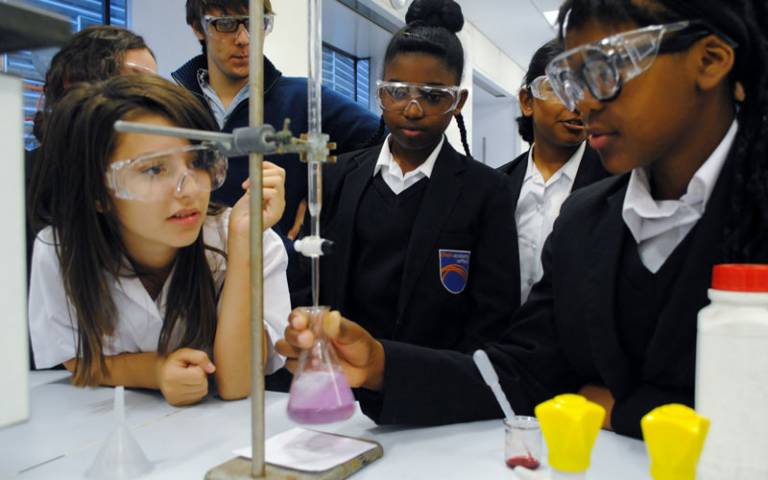IOE academics show how schools can help disadvantaged pupils increase their aspirations in chemistry
17 November 2020
The Royal Society of Chemistry recently launched the first ‘Chemistry for All’ report, written by IOE academics, looking at how outreach in England’s schools can promote engagement with chemistry.

The current report, written by Dr Tamjid Mujtaba, Dr Richard Sheldrake and Professor Michael Reiss, discusses the evaluation of the five-year programme of outreach in 23 English schools, comparing students who received the Chemistry for All programme against students from other comparable schools.
Dr Mujtaba and Professor Reiss talked about the research findings at a virtual event held by the Royal Society of Chemistry last week.
They revealed that at Year 11, students who received the programme expressed more positive aspirations towards chemistry studies and careers, interest and enjoyment in chemistry, and views about chemistry being useful and valued for facilitating careers, jobs, and future opportunities in general. The study has shown that students from less advantaged circumstances can be held back by misconceptions about career options and a lack of real-world relevancy, but that changes and benefits are possible.
The research found that that students’ aspirations closely linked with their views about chemistry qualifications being useful and valued for future careers, and with chemistry being a valued and inherent aspect of their identity. The research also identified barriers for students, including a lack of relevant role models, fewer opportunities for practical learning, and fewer accessible extra-curricular events.
A common theme from the students’ interviews was gendered constructions of ‘natural talent and/or cleverness’. Dr Mujtaba explained that students could consider chemistry to require natural ability or cleverness, which could discourage some students, particularly girls and from disadvantaged backgrounds, from continuing with chemistry.
Dr Mujtaba explained that: “In order to include more students from disadvantaged backgrounds, schools could make small, simple changes in everyday teaching. Helping students see the relevance of chemistry to everyday life would be one way to capture their interest as would informing them of the range of careers that are available from chemistry.
“Promoting the idea that hard work leads to a good understanding of chemistry should help dispel the notion that only those with natural ability are successful with chemistry; this would be particularly helpful for girls who are more likely to internalise problems with understanding chemistry and think ‘chemistry is not for me’.”
The talk revealed there was a core group of girls with high chemistry aspirations in the programme, some of whom were from disadvantaged backgrounds. Girls reported becoming more confident with chemistry because of Chemistry for All activities and some girls were able to align their future selves with chemistry because of the programme.
However, the researchers found that these girls were more likely to report that the classroom climate was disengaging and less likely to report being encouraged to continue with Chemistry at higher level by their teachers and families than boys with high aspirations.
Dr Mujtaba reports that “this was also true of ethnic minority girls who are usually less likely to continue with chemistry at higher levels. The Chemistry for All programme helped to create a chemistry identity and an awareness that a range of people could pursue chemistry careers. The provision of diverse and relevant role models within the outreach programme helped students to feel that chemistry can be for ‘people like me’.”
The event also featured a presentation by Professor Reiss on widening participation and how to put lessons from outreach into practice. The Royal Society of Chemistry are now using the findings from the research to review their outreach activities and acting on the recommendations from the researchers.
Links
- Read the Chemistry for All report (PDF)
- View Dr Tamjid Mujtaba’s research profile
- View Dr Richard Sheldrake’s profile
- View Professor Michael Reiss’s research profile
- Department of Curriculum, Pedagogy and Assessment
- Read the Royal Society of Chemistry news story: 'How can we make chemistry accessible for all?'
- Read the TES article: 'Revealed: The science 'barriers' facing poorer schools'
 Close
Close

